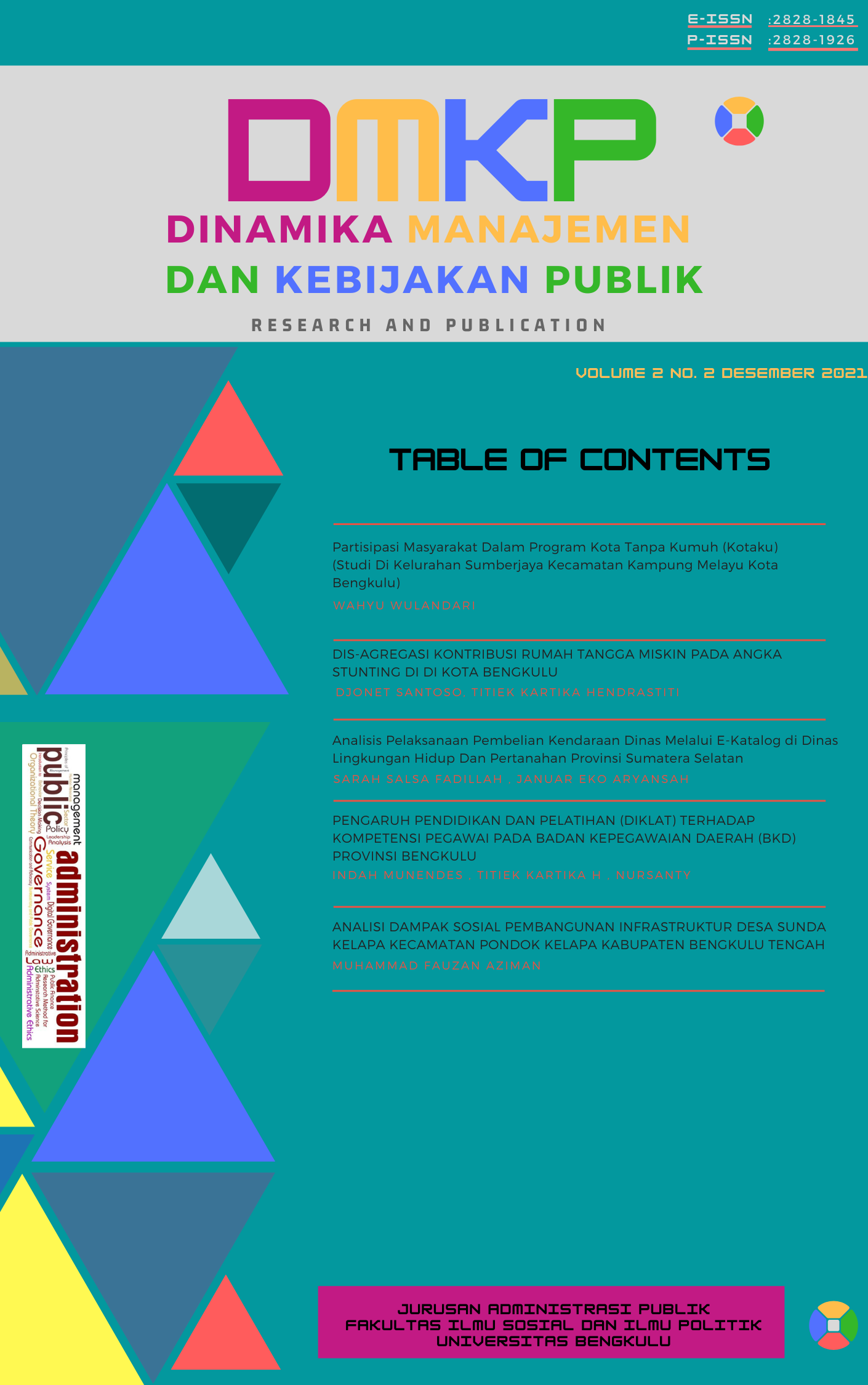Main Article Content
Abstract
In Indonesia, the government through the Ministry of Social Affairs has started to offer social protection measures for people with low economic abilities, one of them is through the Non-Cash Food Assistance (BPNT) program which has been implemented since 2017.The targets for this BPNT program are poor families or communities with the lowest 25% socioeconomic status in the implementation area or vulnerable to social risks. As for the aim is to reduce the burden of KPM expenditure through food fulfillment, provide more balanced nutrition to KPM, increase accuracy of targeting and timing of beneficiaries for KPM,provide choice and control to KPM in meeting food needs, and encourage the achievement of sustainable development goals (Sustainable development Goals/SDGs). Scientific research is conducted to describe implementation of the Non-cash Assistance Program (BPNT) for the urban poor by the Bengkulu City Social Service in 2019.The research method used is descriptive qualitative, which clearly describes the data and facts found in the field. The aspects used by the Riant Nugroho theory application and social regulation No.11 of 2018 concerning the distribution of Non-Cash Food Assistance, namely socialization, planning, implementation and evaluation. From the research results, the authors conclude that the implementation of the BPNT program in the city of Bengkulu in 2019 has not been quite successful.This is evidenced by the existence of several summary interviews that have been conducted. There was a delay in the distribution of funds, lack of socialization and coordination between the implementer and the sub-district and sub-district authorities. BPNT activities at the end caused problems which resulted in the unsuccessful implementation of the BPNT program. The program has not been able to optimally achieve the objectives that have been previously set. the involvement of several program implementers, program implementation mechanisms that are not in accordance with what is stipulated in the implementation guidelines, as well as programs that are judged to be inappropriate with existing conditions in the field. As for the recommendation to make the implementation of this policy successful, it is necessary to have the involvement of all implementing parties in program implementation, it is necessary to readjust the program objectives with the current conditions of KPM in the community.
Keywords
Article Details

This work is licensed under a Creative Commons Attribution-ShareAlike 4.0 International License.
Copyright :
Authors who publish their manuscripts in this Journal agree to the following conditions:
Copyright in each article is the property of the author.
The author acknowledges that Journal of Governance and Public Administration has the right to publish for the first time with a Creative Commons Attribution 4.0 International License.
The author can enter the writing separately, regulate the non-exculsive distribution of manuscripts that have been published in this journal into other versions (for example: sent to the author's institution respository, publication into books, etc.), by acknowledging that the manuscript was first published in the Journal Governance and Public Administration;
Licence :
The Journal of Dynamics Management and Public Policy is published under the terms of the Creative Commons Attribution 4.0 International License. This license allows anyone to copy and redistribute this material in any form or format, compose, modify, and make derivatives of this material for any purpose, including commercial interests, as long as they attach credit to the Author for the original creation.
References
- Baker, J. L. 2004. Evaluating the Impact of Development Projects on Poverty: A Handbook for Practitioners. Directions in Development. The World Bank. Washington, D.C.
- Charles O. JonesdanDavid Carr Baird. 1991. Pengantarkebijakanpublik (public policy). Rajawali.
- Dunn, William N. 2000. Analisa Kebijakan Publik, Gajah Mada Pers, Yogyakarta.
- Finsterbusch, Kurt and Annabelle Bender Motz 1980. Sosial Research for Policy Decisions. Belmont, California: Wadsworth Publishing Company.
- Islami, Irfan. 2002. Prinsip-prinsip Perumusan Kebijakan Negara, Bumi Aksara, Jakarta
- Moleong, Lexy J. 2000. MetodePenelitianKualitatif, RemajaRosdakarya Bandung.
- Patton, Michael Quinn. 1990. Qualitative and Research Methods. SAGE Publication, Newbury Park, California.
- Pranarka. 1996. Pemberdayaan: Konsep, Kebijakan, danImplementasi, PustakaSinarHarapan. Jakarta.
- Stame, Nicoletta. 2004. Theory-Based Evaluation and Types of Complexity, Sage Journals Online.
- Sugiyono. 2009. MetodePenelitianKuantitatif, Kualitatifdan R & D. CV.ALFABETA
- Wahab, Solichin Abdul. 1990. Pengantar Analisis Kebijaksanaan Negara, Jakarta: LP3ES
- Wahab, Solichin Abdul. 2002. AnalisisKebijaksanaan: dariFormulasikeImplementasiKebijaksanaan Negara, Jakarta :SinarGrafika
- Wibawa, Samodra, dkk. 1994. Evaluasi Kebijakan publik. PT. Raja Grafindo Persada, Jakarta.
- Winarno, Budi. 2002. Teori dan Proses Kebijakan Publik, Media Presindo,Yogyakarta
- SuhardidanSunarti, S. (2009). Sosiologi 1: Untuk SMA/MA Kelas X Program IPS (PDF). Jakarta
- Keith Davis. 1962. Human Relations at Work, (New York, San Francisco, Toronto, London: 1962
- Soemardjan,Soemardi. 1974.Setangkai Bunga Sosiologi, Jakarta, Lembaga Penerbitan Fakultas Ekonomi Universitas Indonesia
- Anonim.2020. profilDesaSundaKelapa
References
Baker, J. L. 2004. Evaluating the Impact of Development Projects on Poverty: A Handbook for Practitioners. Directions in Development. The World Bank. Washington, D.C.
Charles O. JonesdanDavid Carr Baird. 1991. Pengantarkebijakanpublik (public policy). Rajawali.
Dunn, William N. 2000. Analisa Kebijakan Publik, Gajah Mada Pers, Yogyakarta.
Finsterbusch, Kurt and Annabelle Bender Motz 1980. Sosial Research for Policy Decisions. Belmont, California: Wadsworth Publishing Company.
Islami, Irfan. 2002. Prinsip-prinsip Perumusan Kebijakan Negara, Bumi Aksara, Jakarta
Moleong, Lexy J. 2000. MetodePenelitianKualitatif, RemajaRosdakarya Bandung.
Patton, Michael Quinn. 1990. Qualitative and Research Methods. SAGE Publication, Newbury Park, California.
Pranarka. 1996. Pemberdayaan: Konsep, Kebijakan, danImplementasi, PustakaSinarHarapan. Jakarta.
Stame, Nicoletta. 2004. Theory-Based Evaluation and Types of Complexity, Sage Journals Online.
Sugiyono. 2009. MetodePenelitianKuantitatif, Kualitatifdan R & D. CV.ALFABETA
Wahab, Solichin Abdul. 1990. Pengantar Analisis Kebijaksanaan Negara, Jakarta: LP3ES
Wahab, Solichin Abdul. 2002. AnalisisKebijaksanaan: dariFormulasikeImplementasiKebijaksanaan Negara, Jakarta :SinarGrafika
Wibawa, Samodra, dkk. 1994. Evaluasi Kebijakan publik. PT. Raja Grafindo Persada, Jakarta.
Winarno, Budi. 2002. Teori dan Proses Kebijakan Publik, Media Presindo,Yogyakarta
SuhardidanSunarti, S. (2009). Sosiologi 1: Untuk SMA/MA Kelas X Program IPS (PDF). Jakarta
Keith Davis. 1962. Human Relations at Work, (New York, San Francisco, Toronto, London: 1962
Soemardjan,Soemardi. 1974.Setangkai Bunga Sosiologi, Jakarta, Lembaga Penerbitan Fakultas Ekonomi Universitas Indonesia
Anonim.2020. profilDesaSundaKelapa
